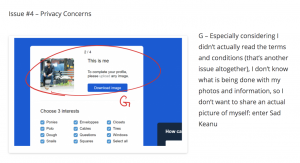Without question, the most infuriating exercise of ETEC540 was the User Inyerface ‘game’ done in Week 10. The interface created by Bagaar was developed as a means of illustrating various sets of dark patterns many internet users may experience when navigating through the digital world. The task also demonstrated a variety of key considerations web developers need to appraise when building web interfaces and alternatively, highlights what many internet users may take for granted in the fundamental processes of traversing the digital realm. The game is completely counterintuitive to the ways in which we’ve been (un)consciously programmed to utilize the fundamental design conventions within the internet and strove to waste as much of the users time as possible.
Of course, many of us recognized the plethora of dark patterns utilized in the game: The overall poor design, the double negatives strewn across the password creation page, the ambiguous words and images on the CAPTCHA page, the misdirection created with a selection of eye catching buttons, and of course, the hidden information embedded within the Terms and Conditions link. It seems, however, that only a few of us had deep concerns about the privacy aspects of the User Inyerface game.
Personally, I did not use any of my real information in this game. I immediately questioned the degree of information privacy I was afforded and chose not to type my name or use any form of legitimate password, username, or email. The poor design of this interface instantly raised a red flag for me; it made me feel like this site was plastered with fake ads, where my computer could be threatened by pernicious viral software, or worse, my personal data stolen. I realized quickly, it was simply an intentionally poorly designed game meant to challenge, frustrate, and obstruct users by demonstrating a number of dark patterns.

Similarly, James conceded that he did not read the Terms and Conditions, yet still had questions regarding what was being done with the information he was submitting. He had concerns specifically about the image he was asked to upload. Like him, I did not upload an image of myself, and rather used some stock image from the internet. Comparatively, Selina knew that this was only a game, and the knowledge that she was not threatened by the possibility of downloading malicious software emboldened her to become more adventurous with her clicks. Ultimately, it was Meipsy’s characterization of data and information collection that prompted me to think: perhaps data privacy is the true currency within the attention economy.
In his TedTalk, Tristan Harris suggests that social media, advertising companies, and digital marketing strategies are vying for one thing: our attention, and the best way to achieve that is to understand how our mind’s work. From autoplay functions, to algorithms that determine what and when we will view content, the internet and the forces behind it have fashioned a digital infrastructure dictated on our habits, behaviours, and in some cases, our personal information. Moreover, Harry Brignull suggests that the levels of deception used to gather these details are often very subtle, appealing to the users negligence, unawareness, or naivety.
Harris also asserts that the internet does not evolve on a whim, rather it is calculated in the way it strives to understand it’s users’ patterns. The User Inyerface game illustrates how those subtle deceptions can gather information about us but also, shields us from any threat. Afterall, it is simply a game and the gathered information goes nowhere (Or does it?). Ultimately, if we were to apply these realized patterns to other more malicious web spaces, it becomes quite clear how these programs go to great lengths to assemble information pertaining to the products we buy and are partial to, the forms interaction with other users and information online takes, and what subjects we are most prone to becoming involved with in an online space. This information is the equivalent of gold to the social media, advertising, and marketing industries; it allows them not only pinpoint specific populations to target with marketing campaigns, but allows strategic deployment of products and services conditional on a seemingly infinite number of factors (ie – age, sex, location, profession, to name a basic few). Of course, this can be done honestly as well.
Further, we are approaching a point where these algorithms are evolving to increasingly attempt to match our online and offline behaviours. Meipsy closes her reflection with an interesting thought:
As we learn more about how information is gathered and how we are manipulated, hopefully we will also become more adept at understanding these persuasions and take control and push back against the way these companies manipulate us for their own end game and purposes.
Although I tend to give perhaps more credit to the new generational members of the internet community with respect to spotting these manipulative designs, I can foresee these dark persuasions evolving alongside our increasing awareness. Regardless, through understanding our personal information as the currency by which these entities construct the infrastructure of the attention economy, the more we will be able to effectively and willfully participate in a more equitable redesign of the internet’s fundamental conventions. If we function as if data privacy is as valuable as it’s monetary counterpart, the less manipulation is bound to occur in the digital realm.
Brignull, H. (2011). Dark Patterns: Deception vs. Honesty in UI Design. Interaction Design, Usability, 338.
Harris, T. (2017). How a handful of tech companies control billions of minds every day. Retrieved from https://www.ted.com/talks/tristan_harris_the_manipulative_tricks_tech_companies_use_to_capture_your_attention?language=en
Tufekci, Z. (2017). We’re building a dystopia just to make people click on ads. Retrieved from https://www.ted.com/talks/zeynep_tufekci_we_re_building_a_dystopia_just_to_make_people_click_on_ads?language=en
